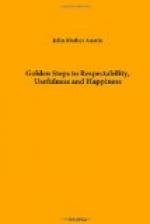Dancing, when viewed in the light of a pleasant bodily exercise, is undoubtedly healthy and beneficial. It is peculiarly so to females, and those whose occupation and habits are of a sedentary character. When properly engaged in, it strengthens the limbs, developes the chest, enlarges the lungs, and invigorates the whole system.
But this pastime is greatly abused, and is so perverted as to have become one of the most serious evils. In this view, it is subject to severe and well-grounded censure. As dancing is usually conducted in modern times, it has proved one of the greatest evils into which the youthful have fallen. The routs and balls to which the young resort, as generally managed, cannot be too severely condemned. The late hours to which they are prolonged—the rich and unhealthy pastry partaken of in abundance—the intoxicating drinks passed around, or conveniently found in the side-room, or at the bar—the thoughtless manner of dressing, exposing to cold and damp, and so confining the lungs, that when, by reason of exercise, they need the most room for expansion, they have the least, thus sowing the seeds of speedy disease and early death—the long-continued excitement and over-fatigue—the improper company which often assembles on such occasions—these all combine to make such assemblages a source of injury in all their influences and consequences. They should be discountenanced by every parent and well-wisher of public good. The young of both sexes, who have any just regard for their morals—and their health, should avoid these routs, and balls, and cotillion parties. Their tendency, in every respect, is evil in the extreme.
Dancing among children [unreadable] their pastimes—or by young people, at private parties, or social gatherings, engaged in temperately, and for a brief period, with proper precautions in regard to health, cannot, be objectionable. In this, as in most other amusements, it is the excess, the abuse, that causes the injury.
In urging these considerations on the young, I would not seek to deprive them of any amusement suited to their age and circumstances. Youth is the season of joyousness—of light-hearted pleasure, and budding hope. I would not overshadow one ray of its bright and beautiful sunshine—nor check one throb of its innocent pleasure. The shadows, the cares, and burthens of life, will come upon them full early enough, at the latest. In the spring-time of their days—the delicious, romantic morning of their being—they can experience some of the sweetest hours of their earthly existence. Nor would I rob them of that which God and nature designed them to enjoy. But I would have them seek for innocent amusements—for recreations and enjoyments, of a pure and elevated character. None other can make them truly happy. All things sinful in their nature, or demoralizing in their tendency, are unmitigated evils, destructive in their consequences. However attractive they may appear to the inexperienced, in the form of amusements, yet in the end, they will “bite as a serpent, and sting as an adder.”




